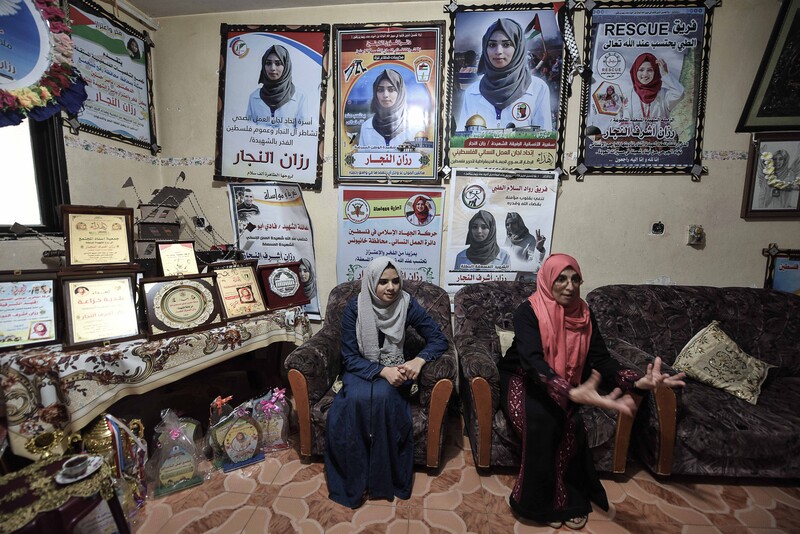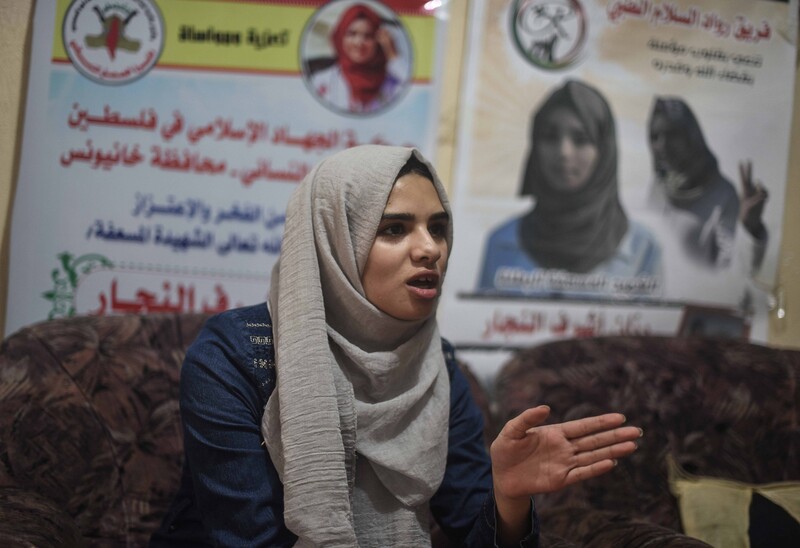The Electronic Intifada 12 September 2018

After her sister was killed by an Israeli sniper, Rayan al-Najjar (left) completed her high school matriculation exams with the encouragement of her mother Sabreen (right).
Rayan al-Najjar had hoped to study law when Gaza’s universities open this month. Israeli aggression caused her to change plans.
On 1 June, Rayan’s sister Razan, a medic, was killed as she treated people wounded during the Great March of Return. Her death has prompted Rayan to pursue a nursing degree at Al-Azhar University.
“This is the least I can do for my sister,” the 18-year-old Rayan said.
Before she could enroll for college, Rayan had to complete her final high school exams, the tawjihi.
Rayan was actually revising for her tests on 1 June. In their final conversation, Razan had casually suggested that Rayan could help her work at the Great March of Return.
Thinking that Razan was serious, Rayan agreed, saying she could complete her revision after heading out to the protests. But Razan clarified that she was joking, encouraging Rayan to stay focused on her exam preparation so that she could obtain good grades and do the family proud.
Soon afterwards, Rayan had an unpleasant sensation.
“I was studying in Razan’s room,” Rayan said. “Suddenly, I felt some tightness in my heart, I felt that something wrong had happened. I asked my mother to phone Razan to check on her. But while we were talking, one of our relatives called to tell us that Razan had been injured.”
Approximately 10 minutes later, the family received another phone call with the news that Razan was dead.
Rayan was devastated. When friends and neighbors began calling on the family’s home, offering condolences, she sat among them at first, crying quietly. Then her mother, Sabreen, took her hand and brought her to Razan’s bedroom. Sabreen asked Rayan to remain as strong as she could and to concentrate on her exams.
Rayan had to sit one of those tests the following morning. Arriving at her school in the Khan Younis area in southern Gaza, she was taken to a different room than most of the pupils. The teachers felt it was best for both her and the other pupils if she sat her test away from everyone else.
The test took place at the same time as Razan’s funeral, so Rayan was unable to attend it. “I never expected that I would have to do a test under those circumstances,” Rayan said.

Rayan al-Najjar was sitting for her exams during her sister’s funeral.
The results of her exams were provided via a text message the following month. Rayan had scored an average grade of slightly less than 60 percent. It wasn’t as high a score as she had aimed for but was reasonable, considering what her family had endured.
By pursuing a nursing degree, she is seeking to fulfill an ambition that was denied to Razan. Although Razan had wanted to study nursing at the university level, her family did not have enough money for her fees. As a result, Razan was trained in nursing by the International Committee of the Red Cross.
Rayan’s own fees are being paid with the help of donations the family has received since Razan was killed.
“I will follow Razan’s dream of studying nursing and provide treatment to those who need it,” said Rayan.
Deprived of a dream
Omar Abu Hashim begins his studies in information technology at the University College of Applied Sciences in Khan Younis this month.
It was not his first choice. He would prefer to be pursuing a degree in architecture but did not obtain the right grades in the tawjihi for that option.
“I’ve always dreamed of being an architect,” said the 18-year-old Omar. “But an Israeli sniper has deprived me of my dream.”
The sniper in question shot Omar in the left leg on 14 May, the day Israel committed a massacre of about 60 unarmed demonstrators.
Omar had joined the Great March of Return in Rafah, a city in southern Gaza.
His mother Mirvat had asked him not to participate in the protests. But Omar insisted on going, while promising that he would stay away from the boundary between Gaza and Israel.
Omar was around 700 meters from the boundary when he was shot. Along with other young men, he was throwing stones in the direction of the boundary fence.
The injury he received was so serious that Omar had to have his leg amputated.
Doctors treating him told him that he would be able to take his exams. But he had to do so from a hospital bed.
“I used to spend the night hours studying,” he said. “But I was often in pain and exhausted. It was extremely hard to focus.”
“Never give up”
After the first in a series of exams, Omar said that he did not wish to take the remainder. Yet his mother persuaded him to continue.
He managed to secure an average grade of 55 percent.
“Insisting on completing my education is a message to Israel that we’ll never give up,” he said.
As the college term begins, many families are mourning for those killed without having an opportunity to advance their education.
Salwa Abd al-Al recently learned that her son Khaled, a 17-year-old child, had scored an average grade of 51 percent in the tawjihi. She marked his success by offering sweets to neighbors in Rafah.
The gesture was symbolic. Khaled had been planning to study law in Turkey. Yet he was killed on 2 July – less than a week before his exam results were released.
Khaled was among four people who had taken action against Israel’s occupation forces on that day.
The group of youth had breached the boundary fence separating Gaza and Israel. They had then set fire to a post used by Israeli snipers during the Great March of Return.
Khaled was shot dead by Israeli forces. Two of the other three were arrested – one of whom had been wounded. Another young person, a child, was also injured by a live bullet but managed to flee the scene, the Palestinian Center for Human Rights has reported.
Khaled’s body has not yet been returned to his family.
“Israel has prevented me from hugging my son for the last time,” said his mother Salwa. “And it has stopped me from seeing him go to university like his friends.”
Sarah Algherbawi is a freelance writer and translator from Gaza.





